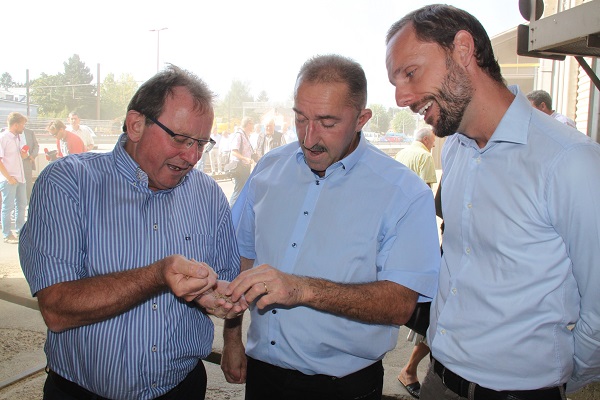
On Tuesday 30 August 2016, the annual agricultural harvest was reviewed at the Moulins de Kleinbettingen in the presence of Luxembourg's Minister for Agriculture, Viticulture and Consumer Protection, Fernand Etgen; the management of the Moulins de Kleinbettingen, the Lëtzebuerger Saatbaugenossenschaft (LSG) and Minister Etgen presented their relevant assessments.
The dependence of agriculture on nature is again very clearly visible this year. Luxembourg's agriculture experienced much rain and humidity during the main 2016 growing season, which encouraged cereal diseases. The "oulins de Kleinbettingen characterised this year as a reduction in supply of grain of between 20 - 25% compared to the annual average. Despite this, Minister Etgen welcomed the existence of such enterprises as the technologically-modern Moulins de Kleinbettingen which incorporate high-performance processes through structures and systems; as a result, the primary products and thus de guaranteed to possess the desired quality parameters. Minister Etgen acknowledged the appropriate investments in these areas that continue to be strongly encouraged by the new Farming Bill.
Minister Etgen noted further that it is the main task of agriculture, viticulture and horticulture, to produce food of excellent quality. The future of Luxembourg agriculture is not in cheaper mass-production, but in the production of quality products with a certain added value. Thus is particularly advantageous in the area that initiatives and quality labels prevail. The "Produit du Terroir" label, which has existed for 20 years, was singled out in this context because it is based on the principles of integrated farming and by rigorous consumer checks to provide a guarantee with respect to quality, traceability and regionality. All these points are relevant to sustainable development.
Furthermore, Minister Etgen spoke about the currently very low world market prices in the cereals sector, affecting the income of farmers both directly and indirectly.
Summary of the harvest in 2016, based on information as of 26 August 2016:
• Quantity:
- The yields are very heterogeneous and therefore very difficult to achieve average incomes;
- The yields concerning all grains are on average below the long term average. Specifically, winter barley yields are well below the long-term average. Winter rape harvest is around 20% below the long term average, however this is protected by a fixed price level.
• Quality:
- Outgrowth was partially observed in triticale, rye (are both very sensitive) and various A and B- wheat varieties;
- Fusarium (corn fungus) probably exists but thas been separated from the food cycle;
- The weather was very unstable at the beginning of the growing season, but the bulk of the crop could be harvested under normal conditions;
- This year, the Moulin's dryer came back into use, even if only to a small extent (winter barley, canola, wheat first games).
• Prices:
- Prices are currently on average about 10-15% below last year's level and thus at about the same level for the past 3 years, except winter barley where the price is circa 20% below;
- Rapeseed prices are good and rising (partially offset lower income).








